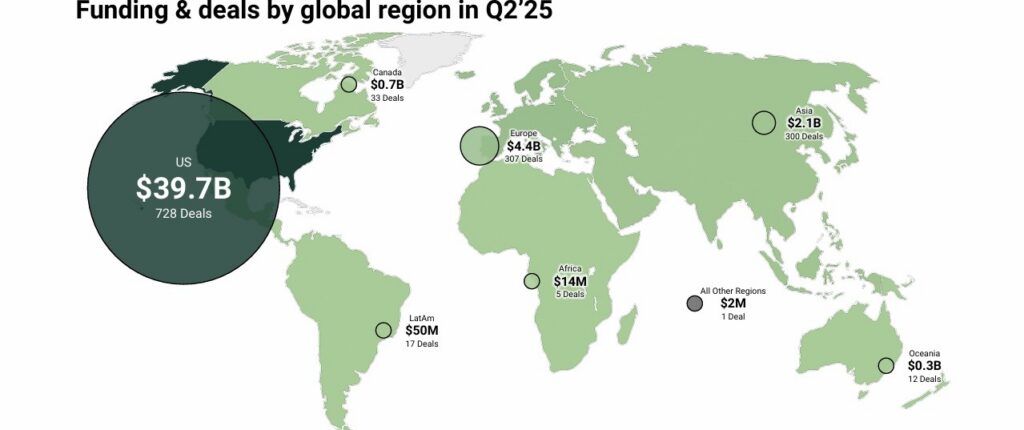|
Getting your Trinity Audio player ready...
|
Artificial intelligence (AI) startups had another blockbuster quarter in Q2, raising over $47 billion, or nearly half of all global venture funding. However, the growth was uneven, with Africa only accounting for 0.02% of the total as the region lags further behind in the AI revolution.
According to insights from Crunchbase, AI startups raised $40.6 billion in Q2, the third-highest quarterly raise on record, and 45% of the overall $91 billion raised by startups. Scale AI accounted for nearly a third of the AI funding after Meta (NASDAQ: META) invested $14.8 billion in the data labeling startup in June. Elon Musk’s xAI raised $6 billion in May, while AI cloud services provider CoreWeave secured $1.1 billion in the same month.
While startup valuations balloon and investors pour billions of dollars into AI, Africa has been missing in action. Of the $47.3 billion, African startups only raised $14 million in Q2, translating to a measly 0.02% of the total across five deals. This made it the least funded region by a mile.
In contrast, the U.S. dominated funding with $39.7 billion raised in 728 deals. At $4.4 billion across 307 deals, Europe was second, with Asia’s $2.1 billion in 300 deals placing it third. Oceania raised $300 million, while Latin American startups brought in $50 million.

Among the startups that raised funding in Q2 were Senegal’s Kera Health, which secured $10 million in June from the IFC, the World Bank’s venture arm. Kera uses AI to consolidate patient information in one platform for easier clinical decision-making. According to the World Health Organization (WHO), Senegal has one doctor for every 10,000 citizens, making services like Kera critical to the West African nation.
Beyond the direct AI integration firms, investors have also targeted auxiliary service providers, like Egypt’s semiconductor startup Infilink, which raised $10 million in one of the biggest rounds for a deep-tech startup in MENA. Africa is home to less than 1% of global AI compute power, and startups addressing this challenge continue to attract high interest.
Globally, AI funding was dominated by around 20 companies, which accounted for a majority of the funding. Besides Scale AI, other big names included Safe Superintelligence and Thinking Machine Labs, which both raised $2 billion. Former OpenAI Chief Scientist Ilya Sutskever founded the former, which is now valued at $32 billion, while the latter was founded by OpenAI’s ex-CTO Mira Murati and is valued at $12 billion.
Industry leaders were also active in acquisitions, with OpenAI splashing $6 billion on io, an AI hardware firm founded by former Apple (NASDAQ: AAPL) executive Johnny Ive.
Africa’s AI funding gap mirrors a similar disparity in the blockchain sector. Last year, African blockchain startups raised $122.5 million, translating to 1% of the $12.1 billion the sector raised globally. Pan-African exchange Yellow Card accounted for over a quarter of the funding with its $33 million Series C raise.
Namibia launches AI readiness report
Namibia has published its AI Readiness Assessment Report, outlining the country’s capacity to adopt the technology.
The report was compiled by the National Commission on Research, Science and Technology, and gauges the South African nation’s ability to develop, integrate, and police AI. It was based on UNESCO’s assessment methodology, which the global organization released four years ago to assist member states in adhering to responsible AI development practices.“AI is not just about machines and algorithms. It is about people,” commented Dino Ballotti, the deputy minister of innovation.
“It is about ensuring that children in rural Namibia benefit from adaptive learning platforms, that farmers can access climate-smart data, that healthcare workers are supported with diagnostic tools and that our youth can create, innovate and thrive in the Fourth Industrial Revolution.”
The assessment comes four months after the Namibian government launched a National AI Strategy, which singled out healthcare, agriculture, mining and education as the four sectors set to benefit the most from AI integration.
The new assessment report touted Namibia’s progress in adopting AI but acknowledged that challenges such as limited electricity access and an AI skills gap hinder growth. The country has also been working on the Data Protection Bill, which needs to be implemented to preserve Namibians’ data.
While UNESCO praised the government’s effort and lauded the new report, local AI experts say the country needs concrete action, not new studies on the same age-old challenges.
“If Namibia wants to participate meaningfully, our focus must shift from repetitive reporting to practical implementation, inclusive capacity building, robust infrastructure investment, and [state-of-the-art] research outputs,” one local expert opines.
In order for artificial intelligence (AI) to work right within the law and thrive in the face of growing challenges, it needs to integrate an enterprise blockchain system that ensures data input quality and ownership—allowing it to keep data safe while also guaranteeing the immutability of data. Check out CoinGeek’s coverage on this emerging tech to learn more why Enterprise blockchain will be the backbone of AI.
Watch: Demonstrating the potential of blockchain’s fusion with AI

 03-02-2026
03-02-2026 




